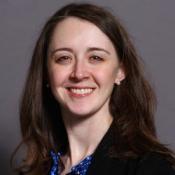 Heather Whitney
Heather Whitney
As a science professor at Wheaton, I stake a very strong claim that science is an integral part of a liberal arts education – and so are all the other disciplines. I seek to craft a classroom environment in which we investigate and learn a given science field with appropriate rigor but always keep an eye open for how other fields can help students understand a physics topic more broadly and thoroughly, and how understanding physics can work vice versa. But to do this effectively, I need to get myself out of my classroom and lab and have experiences and conversations outside of my day-to-day experience and comfort zone. I am grateful for the experiences that Wheaton College offers to its faculty so that we may continuously learn and develop ourselves and thus be better teachers. The CACE summer seminar for faculty is a very important part of those offerings.
The 2017 CACE faculty seminar focused on Willie James Jennings’ The Christian Imagination: Theology and the Origins of Race. You’ve probably already asked yourself why a physics professor was interested in this book and topic. Here’s my answer: scientists are humans and our work impacts humans. Thus, we should continuously strive to learn more about humans through lenses other than our own, and this includes spending time with both the work of other humans and with humans themselves. I’ve used the word humans here several times intentionally. Sometimes people can have in mind that a physicist’s work is done without much role for relationship. But on the contrary, I am a better physicist when my work is done relationally, both for the science itself and in connection with others.
The topic of our discussions, the theological origins of race, was of interest to me both personally and professionally: personally because I was raised in a Southern church and town where it could be said there were still vestiges of the Jim Crow era, or at the very least a sort of benign, perhaps even negligent sense of how ideas of race can affect or even inhibit relationships; professionally because I work with people and medical data from people and need to have a fuller sense of what we all bring to the table, explicitly or implicitly. To learn more about my personal background and the stories of others, I need learning experiences, and reading this book was a welcomed one. The CACE seminar format, in my view, gives faculty a little personal treat at a good time, right after spring courses are finished. It gives us the chance to take on the role of student. There is ample time for discussion and I greatly appreciated how the CACE seminar usually involves bringing in the author of the work that is read. Listening to Dr. Jennings discuss his motivation for writing the book, ancillary thoughts, discussions, and readings that he has collected on the topic, etc. enlivened the reading and faculty discussion even more. At Wheaton we talk a lot about the embodiment of learning, and the CACE seminar is true to those values. I found it absolutely essential to spend time with fellow faculty and with our book author so that I could fully devote myself to learning.
I came away from this year’s CACE seminar with a very strong impression that I believe will be helpful to me personally and professionally. In his book, Jennings laments what he calls a “diseased social imagination” in Western Christianity, and he unravels for readers how it came to be and proposes how it may be addressed in matters of racial justice. I’ll hopefully be a better physics professor in both my teaching and scholarship as I hopefully have developed a stronger sense of humanity.

